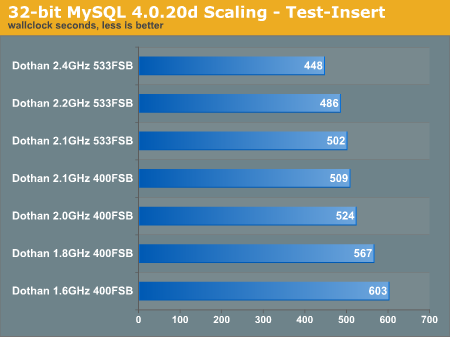Linux and the Desktop Pentium M: Uncommon Performance
by Kristopher Kubicki on December 24, 2004 12:00 PM EST- Posted in
- Linux
Database Tests
MySQL 4.0.20d has been a staple of our Linux tests since its inception. Even though it does not carry high relevance for a workstation test, we still regard it as the de facto free, open sourced benchmark for Linux. Below, you can see our results for sql-bench on both the 32-bit kernel for SuSE 9.1.

Our first benchmark with Pentium M seems almost too good to be true. Just to verify that our results are sane, we re-ran the same tests with several different multipliers set on the Dothan 2.1GHz.


Surprisingly, things look very favorable for Pentium M thus far. However, this is a mildly synthetic benchmark and it may not represent real world use as closely as many of our other benchmarks do. As you can see, we overclocked and underclocked the processor a little bit just to get a feel of what our Pentium M is capable of. Many of our database performance tests in the past have shown that Xeons with additional L3 cache out-perform Xeons without extra cache. So, we might be safe to assume that the 2MB L2 cache on the Pentium M is what gives the Dothan the additional boost. To date, the Dothan has more L2 cache than any other processor that we have seen.










47 Comments
View All Comments
Lynx516 - Monday, December 27, 2004 - link
What yozza says is true gcc 3.4.1 is old especially a pre release. As yozza said it has some bugs in it with respect to the pentiu_m march flag.I have been running gcc 3.4.3 for atleast 2 months and i definatly was not one of the first to use itKristopherKubicki - Monday, December 27, 2004 - link
Yozza: I made some corrections. Saying GCC 3.4.1 is "pretty old" seems pretty hard for me to swallow, but the rest of what you say seems correct. I would be interested in seeing your P-M compile time benchmarks.Kristopher
Yozza - Sunday, December 26, 2004 - link
The march=pentium-m flag was pretty broken on earlier gcc 3.4 releases, and it seems that you're using quite an early "3.4.1 (prerelease)" version, which could explain a few things, especially your TSCP benchmarks, where the Pentium-M is the only one to have its performance _decrease_ with optimised (march=pentium-m) compiler flags. This clearly indicates some issues with pentium-m optimisations in your gcc revision (3.4.1 is pretty old these days).The extremely slow kernel compile time is especially surprising though. I did some test just now on my 1.7GHz Banias P-M, and the kernel compile times do NOT appear to correspond with your results. So I guess something seems amiss with your system configuration.
There was certainly some pretty impressive performance in the integer-dependent tests such as the database one -- we already know that the P-M's fp performance isn't that great, which explains some of the more fp-dependent benchmark results. I for one was pretty impressed by its performance in the majority of the benchmarks and by its scaling possibilities, both wrt FSB/memory and core freqs. If only Intel would upgrade the platform to 800MHz FSB with dual channel DDR400; such a configuration would be appear to hold a lot of promise.
The argument that "Dothan is adherently a linear processor" doesn't hold water either (it should be "inherently" too), since the kernel compile uses one thread by default. Regardless, it should have been possible to test different CPU schedulers to determine how well Dothan deals with multi-tasking loads, particularly wrt compile times by comparing different "MAKEOPTS=-jX" settings. Behaviour under such loads is as dependent on the CPU scheduler as it is on the CPU itself anyway.
Hence, clearly, the comment "When we stack multiple jobs on the processing queue, Dothan spends a huge majority of its time swapping around" is flawed and incorrect. The implication that the CPU 'swaps around' somewhat like memory paging to disk is rather inaccurate to say the least.
larson0699 - Sunday, December 26, 2004 - link
"...The only additional offering that the 855GME feature provides is a 64-bit PCI-X (not to be confused with PCI-Express) bus..."PCI-X is a "feature" of the 6300ESB ("Hance Rapids") southbridge, NOT the 855GME northbridge.
Other makers used the standard ICH5 southbridge, hence no PCI-X slots.
Such a system would be awesome for a mini RAID server. An adapter from 3Ware would be the perfect utilization of the PCI-X slot provided. Ahh...
vaystrem - Sunday, December 26, 2004 - link
Why not Gentoo?You could do two boxes - compile the entire OS optomized for the Pentium M with latest GCC revision and do the exact same for the Athlon 64 Box.
That would be a lot more interesting comparison and useful than doing these benchmarks on top of Suse whose default optomizations are certainly hurting the PentiumM.
bhtooefr - Saturday, December 25, 2004 - link
BTW, I mean that maybe Intel shut them down...bhtooefr - Saturday, December 25, 2004 - link
Hmm... maybe you're right... After all, it seemed that PowerLeap was dodging my questions about their P-M adaptor (and then tried to pimp the PL-AXP (basically a golden fingers card for Socket A) - if I wanted to unlock an AXP, I'd get a pencil ;-))...Here's the chat: http://cpu-museum.de/forum/download.php?id=334
sprockkets - Saturday, December 25, 2004 - link
Oh well, I just looked at SuSE 9.1 again and 9.2 has the ability with kpowersave to select easily the profiles it will use to run, and will say what processor speed it currently is throttling to.ElFenix - Saturday, December 25, 2004 - link
i'd like to point out that 'heat sink' is actually two words. thanks.KristopherKubicki - Saturday, December 25, 2004 - link
bhtooefr: I am pretty sure intel wont let them do that.Kristopher